| Homepage |
| New books |
| News in Brief |
| list of late magazines |
| Articles Recommended |
Articles Recommended |
|
|
Fourteen Mountain Summits
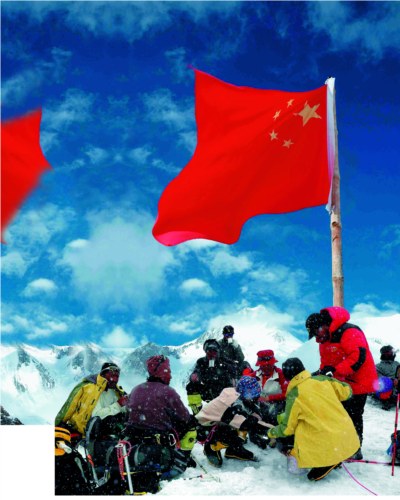
The five-star red flag is waving over the snow-covered land of Mt.Gashurbrum I.
It is twenty past twelve noon on July 12th, 2007. It is an historical and monumental moment for the Chinese mountaineers who have successfully reached the last of the fourteen mountain summits at more than 8000 metres above sea level. The key mountaineers, Tsering Dorje, Penpa Tashi and Luodro, are standing on Mt.Gashurbrum I (8068 meters above sea level), and displaying the five-star red flag while bursting into tears. To reach the last of the fourteen world's highest mountain summits is a triumphant moment.
These mountaineers took a total of fourteen years of struggle at Mts. Himalaya and Mts. Karakoram in pursuit of today's success.
As the first mountaineering team to challenge the fourteen world's highest mountain summits, these Chinese mountaineers have finally realized their dream. They are all ethnic Tibetans and have gone through hardship and dangers over the years; some of them have even contributed their lives to the realization of the project. Finally, three of them have accomplished it and set a marvelous record in world mountaineering that is unprecedented.
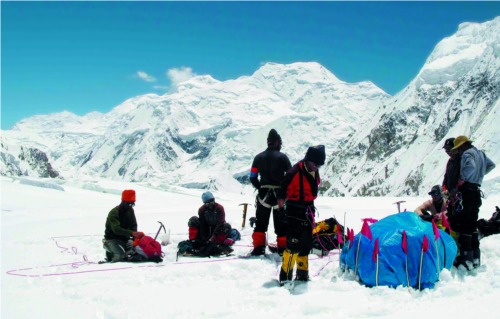
On June 24th,2007,the tibetan mountaineers set up Camp 1 at 5750 metres above sea level in the area of Mt.Gashurbrum 1.
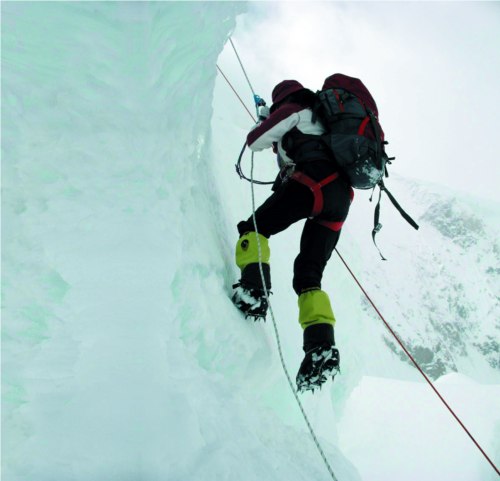
Jiji is climbing the ice-covered cliff.

Road map of Mt.Gashurbrum 1,Penpa Tashi's(the mountaineer) hand drawing in 2005.
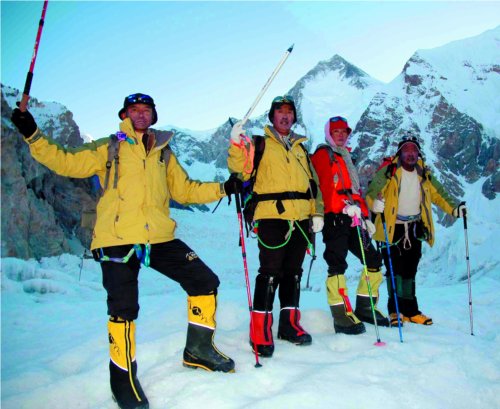
On July fifth,four key mountaineers(Penpa Tashi,Luodro,Jiji,Tsering Dorji(from left to right)set off from the Camp.
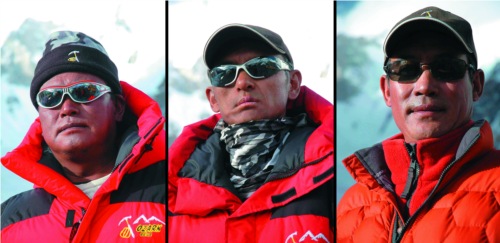
At 22 minutes past nine(Beijing time is 20 past 12 noon) on July 12th ,having climbed for 11 hours,the key Tibetan mountaineers reached to the summit of Mt.Gashurbrum 1.After 40 minutes, they retreated.From left to right,they art Tsering Dorje,Penpa Tashi,and Luodro.
The Ultimate Sacrifice
Haston, the world famous mountaineer, said: "When you reach a certain altitude, difficulties will quickly arise; it is the moment you must be prepared for. If you have the capacity, you will surely survive; otherwise, you will be taken away by Nature."
The Tibetan mountaineers were profoundly experienced Haston's words during 2002. July 21st was the pivotal day to head to the mountain summit. Passing through the second barrier of Mt. Chogori, where geographically it resembled a "bottle-neck", four mountaineers (Tsering Dorje, Penpa Tashi, Renna, and Luodro) had barely reached a spot 210 meters from the summit. A sudden storm engulfed them, pushing them into one metre-deep snow and there was no way out??either up or down. Visibility was almost zero. Their lives were in serious danger.
Having heard a report, Samdrup, the team leader in charge of the camp, immediately ordered a retreat. Tsering Dorje came to the same decision. From the "bottle-neck" area to No. 4 Camp, there were frequent avalanches; as they retreated, they heard the deafening sound of snow slides from different directions.
Having only traveled about one hour, they suddenly heard "Ahhh??" from Penpa Tashi; his left foot had stepped into a hole and he almost slid down to the cliff edge. Having experienced these consecutive setbacks, Penpa Tashi immediately felt weakness in his legs and lay down on the snow. He shouted "If the situation is always like this, we will surely not survive!"
Staggering along, the team members took ages to arrive at the camp. However, they could not find the tents. Since setting off in early morning, they had struggled against the storm for about 14 hours. Without tents, it was hard to imagine what it was going to happen. Moving on for a while, Penpa Tashi suddenly shouted: "The tents are all there!"
Several yellow spots sprouted out from the loose snow. Although the tent poles had already been broken by the snow, the tents offered some protection.
They got into the tents, looked at each other and finally burst out crying. Penpa Tashi said: "It is the first time that I was unable to control myself!"
Over many years, such tense moments arose frequently; whenever facing a situation like this, the mountaineers could only rely on their years of accumulated experience, accompanied by their wisdom, perseverance and beliefs to finally overcome danger. Nevertheless, in 2005, they lost Renna and Penpa Tashi's right ear became deaf and his face was partially paralyzed. What an unbearable memory that was!
At nine O'clock on May 27th, the four vehicles, carrying the Tibetan mountaineers, set off from a small township in North Pakistan to the camp. Nobody knew what catastrophe awaited them.
It was about three o'clock in the afternoon. Having taken a short break, the vehicles set off again. All of a sudden, rocks slid down the mountainside and hit the car in which Renna was sitting. A flying stone pierced the canvas of the vehicle and hit Renna on the head. Blood poured out from his head and he fainted immediately. Meanwhile, a stone hit also Penpa Tashi on the right of his head. Their lives were at risk and the situation was serious.
The accident happened in a narrow valley where a helicopter was unable to land. All vehicles urgently retreated to the riverbank where it was relatively safe. With military assistance, an army helicopter arrived at twenty past five in the afternoon to pick up the wounded mountaineers for first aid. However, Renna stopped breathing before the helicopter arrived. All team members wept.
Over a mountaineering career of about 20 years, Renna has been recognized as a person who was careless of danger. For instance, he usually sat in the most dangerous position when traveling in vehicles; when walking on snow covered land, he preferred to explore the route for others; he was used to arriving at the camp earlier than others so that he could set up the tent and cook food and tea for them. He undertook the duty to photograph the team. Therefore, he always had to use that much extra energy and also take risks so that he could record the mountaineering process.
This unexpected catastrophe upset the plans of the team; in particular, the loss of a key team member was a great blow. However, the team was not defeated. They had vowed to "plant the five-star red flag on the fourteen world's highest mountain summits". They declared their determination to attack their target without delay.
Today, two years have passed. The team has successfully cast off the shadow that has fallen on them because of the catastrophe. They have returned and their dream became reality. Renna's wife was also in the team. She said: "I believe that the only regret of Renna in his mountaineering career was that he did not get to the last of those fourteen summits. I fully supported his vision in the past because it was not only his, but my dream as well. I believed that my success in reaching the mountain summit made up for his disappointment."
Team Work
Tibetan mountaineers believe that they are not separate individuals but rather must act as a team. This was why they are different from others. They rely on the cooperation and disinterested contributions of the team to overcome various kinds of difficulties and finally fulfilled the mission. They are unique in the world.
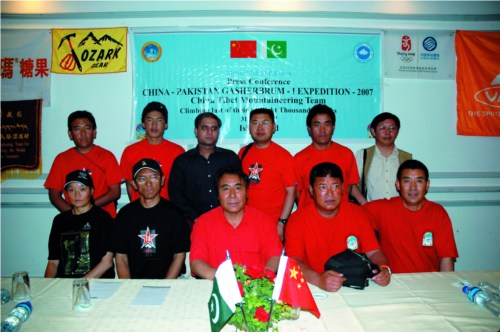
On May 31th, 2007,the Tibetan mountaineers held a press conference in Islamabad, Pakistan.The first row is (left to right)Jiji, Penpa Tashi,Samdrup,Tsering Dorje,and Luodro.Photo by Xue Wenxian.
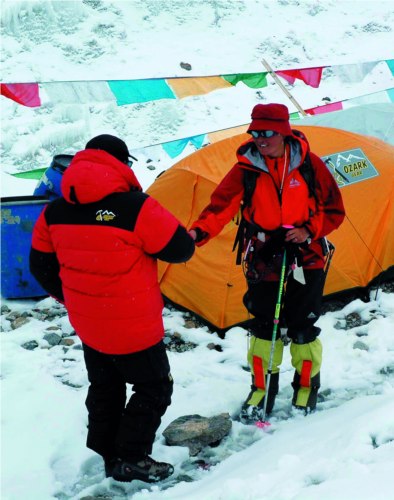
On june 29,the sudden change of weather enabled the mountaineers to return from mountaineering.Samdrup, the team leader,is greeting Jiji in retreat.
In the autumn of 1996, the team tried to challenge Mt. Makalu but due to the unfavorable weather, they had to withdraw. On the way back Doctor Lozang Yundun, who had served with the team, disappeared. This was the first loss of this team.
Samdrup said: "We immediately organized people who were locals from the township to search for him. What I worried about greatly was if he had slipped down a cliff or was taken by bears."
"When it was dark, we organized another team, consisting of Penpa Tashi, Renna, and Darchung, to retrace his route to search for him. This was a long journey that usually took locals four days. We only took 25 hours in the effort to get our colleague back."
Penpa said: "That night, we used our headlights to search across the metre-deep snow that covered the mountain area. Later we heard people say that this part of the mountain area was very dangerous. One family was lost because of an avalanche."
Our team spent seven days on the search. Finally, Lozang Yundun was found by local herdsmen and back to the camp. Samdrup said: "We were all shocked. We were speechless and just stared at each other. Finally, we hugged each other and burst out crying."
On September 27th, 1998, Tsering Dorje, Penpa Tashi, Renna, and Ngag Bu arrived at Camp 4 close to Mt. Lhotse in the Nepalese side. And they were ready to challenge the summit next day. However, a sudden snow blocked the path at the cliff area. Anything can happen anytime.
Penpa Tashi said later: "About 11 o'clock in the night, the snow started to fall. I heard the sound of the snow like the falling of small snowballs. In time, our tent was covered by snow. I was actually lying on my back. On hearing the snow, I immediately turned on my side. Just at this moment, the falling snow unmercifully pressed down on us. I offered my hand to Renna, but I didn't reach him. We all guessed he had been buried. Everything happened at once; we were unprepared and could not find our knives. Three of us worked together to try to prop up the tent. However, the snow was turned to heavy ice and hardly broke through."
When the snow started falling, Renna was sleeping close to the entrance of the tent and naturally rolled his body outside the tent. After he stood up, he found the tent had disappeared.
Renna said later: "I was wearing underwear at that time. I was scared and panicked. I tried hard to dig in the snow and search for the tent. Firstly, I found Penpa, and I hauled him out; then, Tsering Dorje was pulled out; Ngag Bu was the last one. He was hardly breathing. Fortunately, we got him out. If it was minutes later, his life would have been at risk."
At the emergency situation, Renna bravely used his hands and saved his colleagues' lives. His hands were swollen and frostbitten. By the second day blisters had covered all over his hands.
Cooperation and working as a team are always the highest priority of Tibetan mountaineers. They never mind that they might have to take much more responsibilities or face more risks and difficulties; they follow orders and instructions, try hard to extend their talents and strengths; they would never think of themselves first. Sometimes food would be short, everybody would like to take as little as possible so that the others could have more. Mountaineers would always like to lend a hand to others when people needed help.
Of course, as human beings, there were no perfect persons. But their greatest virtue was that they could forgive and be tolerant of others' faults, while sensing the overall situation in order to realize their object. They gave their hearts to cooperate with each other and demonstrate their selfless attitude.
Dream and Glory
By reaching the fourteenth mountain summit, the Tibetan mountaineers realized their dream?? and the glory not only goes to the Tibetan mountaineers, but also to several generations of mountaineers in China.
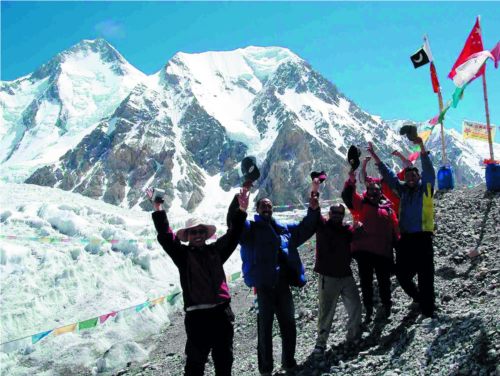
Cheering the colleagues from China and Pakistan who remained at the base camp.

Luodro and other key members are struggling along the steep path from Camp 2 to Camp 3.
Whenever Tibetan mountaineers reached their camps on every targeted mountain, they would like to choose a sunny day to hold a formal ceremony of raising the national flag. Whenever the mountaineers see the five-star red flag waving over the snow-covered land, they felt deeply inspired. It was because they believed that the great motherland was their formidable strength so that they could overcame difficulties and reach the world's highest mountain summits. The ongoing prosperity of TAR always supports Tibetan mountaineers to go abroad for mountaineering.
In 1960, China's mountaineering team first attempted and successfully reached the world's highest mountain summit. When Wang Fuzhou, Qu Yinhua, and Gonpo (ethnic Tibetan) stuck the red five-star flag into the snow of Mt. Qomolangma; they fulfilled the dream of the world to reach Mt. Qomolangma from the north side. It was just this year in which the Tibetan mountaineer team was formed. Over twenty years later several generations of mountaineers, by following their predecessors, have developed their great tradition of mountaineering in a very short period. They have accumulated rich experience on mountaineering. They focus on training a high standard of mountaineers who love their careers in order to help them expand their knowledge of mountaineering technology and develop an outstanding physical strength. Since the opening-up, the economy of TAR has been accelerating dramatically which has produced favorable conditions for the further development of mountaineering in China. Finally, the Tibetan mountaineering team has been gradually expanded; the technology,equipment supply and the quality of mountaineers have been enhanced dramatically.
In February 1992,the Sports Committees of TAR developed a plan to challenge the fourteen world's highest mountain summits. With the support of the government of TAR and based on the original team of Tibetan mountaineers,on April 16th,the Sports Committee of TAR structured the "China's Tibetan mountaineering team to challenging 14 mountain summits,all 8000 metres above sea level",and provided full support such as logistical supplies and funds.
At its foundation at the end of 1992,there were only twelve team members. They were Samdrup (team leader),Wongya,Tsering Dorje,Penpa Tashi,Chimed,Darchung,Gyapo,Luodro,Renna,Ngag Bu (also acting as photographer),Lozang Yundun(doctor and logistic supplier) and Zhang Mingxing (interpreter,who was latter replaced by Mutsa and Phurbu Tsering).
From 1993 to 2006 respectively,the team reached the world's highest mountain summits in Nepal,China,and Pakistan. Three of them reached all fourteen of the mountain summits,but another five mountaineers respectively got to ten,nine,eight,five and three mountain summits in all. As a mountaineering team,they had successfully challenged the world's highest mountains.
Mountaineering is an especially prestigious sport with high input. The strong demands of mountaineering,to some extent,reflect the economic strength of a nation,the quality of its people,and their ethos. Samdrup said: "If there was no strong motherland to support us and if there was no prosperity in TAR as the foundation,there would be nothing today of our Tibetan mountaineering team."